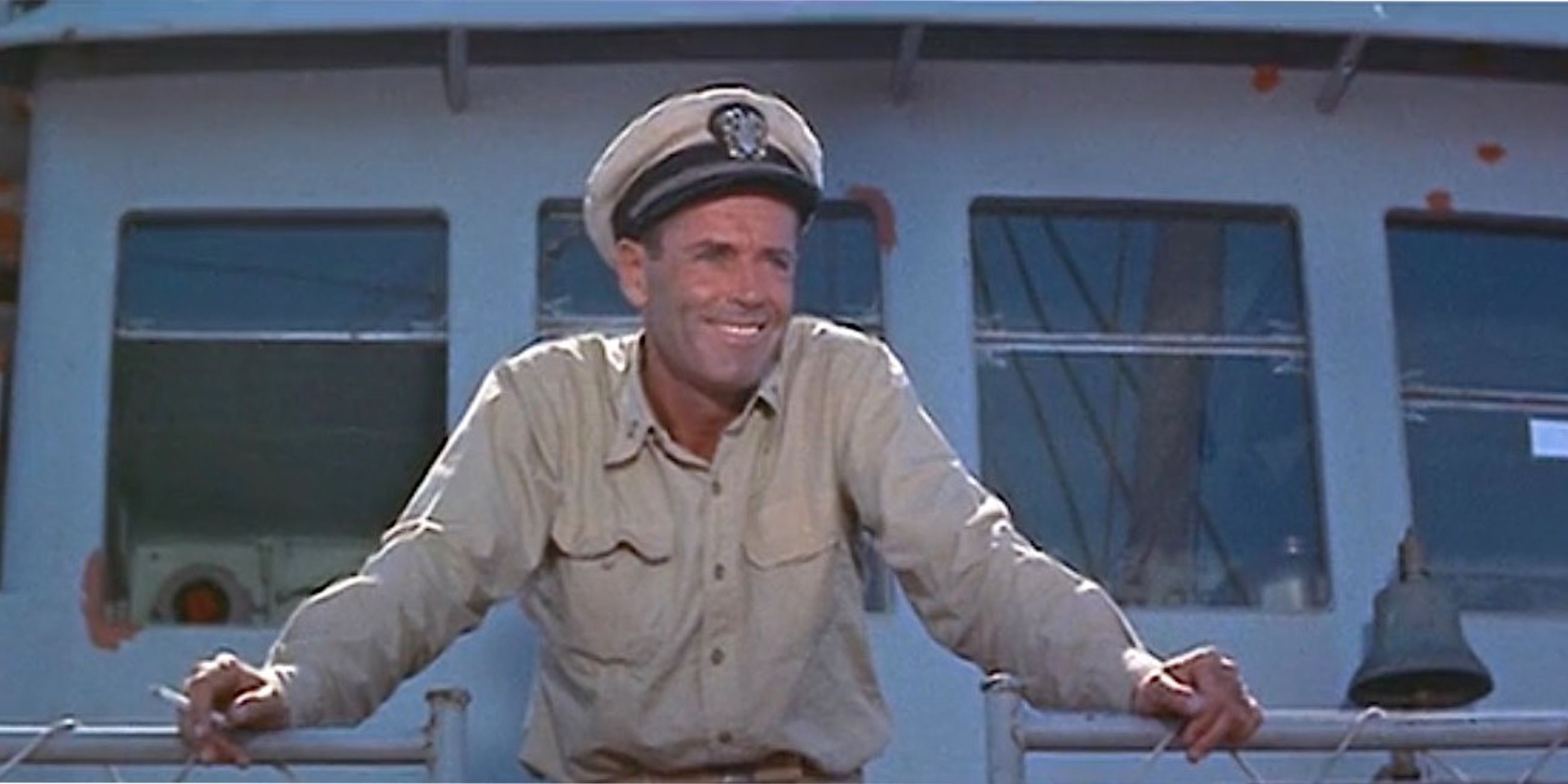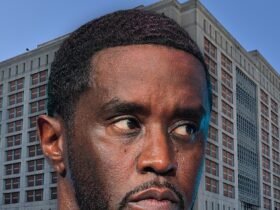The Big Picture
- John Ford, a legendary director, was paradoxical and abusive, often lashing out at collaborators like Henry Fonda.
- Ford’s harsh behavior on the set of
Mister Roberts
led to him punching Fonda, ending their friendship. - Despite the tumultuous relationship, Ford continued his successful career, leaving Fonda feeling their friendship had died.
John Ford is the ultimate paradox of a human being. Arguably the finest American director in history, Ford was not just a filmmaker. He symbolized America for all its beauties and deep-seated flaws. Ford’s films are unabashedly sentimental, painterly, and poetic, but you would never expect that if you ever read or watched an interview with him. Overcompensating for his heart and vulnerability on the screen, Ford was taciturn toward the press, always chewing on a handkerchief as he dismissed any notion of being an “artist” while acting cranky and cantankerous on set. His hard-nosed attitude often boiled over into verbal and physical abuse, with the most egregious case coming when Ford smacked his friend and prolific collaborator, Henry Fonda, in the face on the set of Mister Roberts. After this moment, Ford continued to grow mightily as a filmmaker, but he forever lost a friend.
John Ford’s Unknowable Ways and Paradoxical Behavior
As an Irish immigrant living in Portland, Maine, pursuing art was hardly on the horizon for John Ford. Not long after following his brother Francis Ford‘s footsteps to Hollywood, he became a prolific director of Westerns. By the 1950s, having directed over 100 movies, including groundbreaking classics like Stagecoach, The Grapes of Wrath, and My Darling Clementine, Ford was one of the premier visionaries of Hollywood. Yet, because of his Irish background and combat experience in the Navy during World War II, he seemed trained not to display emotions. Reflecting on his life, Fonda remarked that Ford “was full of bullshit, but it was a delightful sort of bullshit” due to his “tough guy” affectation. His existence is a labyrinth on its own, with hundreds of books, documentaries, and podcasts attempting to crack the Ford enigma. Most cryptic of all, how did someone as tyrannical and abrasive as Ford have such a soft hand behind the camera?
Mister Roberts, a successful Broadway play based on a Thomas Heggen novel of the same name, was adapted for the screen in 1955 by John Ford. Henry Fonda, the star of the stage play, returned to the titular role along with a star-studded cast including James Cagney, Jack Lemmon (who won an Academy Award for his performance), and William Powell. The seriocomic film follows Lieutenant Doug Roberts, who longs to escape from the mundanity of his duty as a cargo chief in the Pacific and join combat during World War II. His transfer requests are denied by his harsh commanding officer, Captain Morton (Cagney), who demands his crew partake in arduous tasks. The Tony Award-winning play seamlessly translated to the big screen, as the film was nominated for Best Picture at the Academy Awards. But it was the chaos behind the scenes that amounted to the most gripping drama.
Henry Fonda and John Ford’s Partnership Came to a Head in ‘Mister Roberts’
As detailed in Joseph McBride‘s definitive biography on the director, Searching for John Ford, the studio was hesitant to cast Henry Fonda in the titular role because of his age and because he had stepped away from movies for a considerable length of time due to his stint on Broadway. Fonda, along with John Wayne, was Ford’s on-screen avatar in Young Mr. Lincoln, The Grapes of Wrath, and My Darling Clementine, and he demanded that Fonda reprise his role as Lt. Roberts. This would be Ford’s last act of kindness and generosity toward Fonda, who was on the receiving end of the director’s most harmful outburst. The candid Ford was unafraid to insult or bark at anyone, including the all-mighty Duke, who he once called an “idiot” and even reprimanded for his acting abilities. On the set of the WWII Navy dramaThey Were Expendable, Ford was so ruthless toward Wayne that he walked off the set in tears. No matter how vicious he acted, Ford viewed his actors and crew members as family. He was commonly referred to as “Pappy” by his friends and collaborators as a moniker of affection.
For Henry Fonda, the lines were drawn on the set of Mister Roberts. As Fonda recalled in his autobiography, My Life, Ford was unhappy with the script, but he was encouraged by the prospect of shooting a movie set in the water, as it hearkened back to his days filming WWII documentaries. An awkward tension permeated the set, particularly between Ford and William Powell, who was coaxed out of retirement to star as “Doc.” After a difficult shoot, Fonda met Ford in his office, who said to his star, “I understand you’re not happy with the work.” The director was notorious for his heavy drinking, and things were already off to a rocky start when Fonda saw Ford with a drink in his hand. “Because he’d been in love with the whiskey bottle for so long, he looked twenty years older than he actually was,” Fonda wrote of Ford, whose health was slowly deteriorating, signified by the eyepatch he donned late in life.
John Ford Punching Henry Fonda Ended Their Friendship
After Fonda kindly explained to him that he was displeased with the recent shoot with Powell, Ford leaped out of his chair, went across the room, and sucker punched Fonda in the face. The actor was clueless as to what triggered Ford to assault him. According to Fonda, he claims that it wasn’t his fist that struck him, but rather, he “ducked, and he caught me with his arm, and it knocked me down,” causing him to stagger back and break a water pitcher. Fonda refused to retaliate. Moments later, Ford meekly apologized to him, but Fonda was disinterested in any pity party. However, he did recognize that he was genuinely contrite over his actions. Although it appeared water was under the bridge, or the Navy ship in this case, Ford’s alcoholism worsened during the shoot, and he was eventually hospitalized for a kidney issue, requiring major surgery. Incapable of serving his duties, Mervyn LeRoy, a steady and reliable director at Warner Bros for decades, replaced Ford as director of Mister Roberts. Perhaps, if Ford had been on amicable behavior, the studio could’ve paused production until he recovered, but he had caused too many headaches.
In typical Fordian fashion, no one could decipher why John Ford punched Henry Fonda in the face. Ford’s paradoxical behavior made him into the legend he is today, and his films and personal life are endlessly fascinating to analyze. For Fonda, the mystique was tiresome. Following the Mister Roberts incident, Fonda never worked with Ford again. The director’s career was hardly tarnished, as only a year later, Ford directed his masterpiece of the American West, The Searchers. At the director’s AFI Lifetime Achievement ceremony, everyone was in attendance, all of Ford’s closest friends and collaborators, except for Fonda. However, around this time, Fonda did participate in Peter Bogdanovich‘s documentary on Ford, where he spoke glowingly about their work. Still, Fonda believed that their friendship died at that exact moment when he was smacked in the face.
Mister Roberts is available to stream on Tubi in the U.S.














Leave a Reply